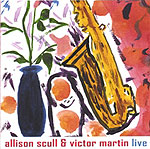
Sharing a creative wavelength
|
This review first appeared in Turbula in June 2006.
Guitar and saxophone? Jazz, right? What if we add acoustic guitar and vocals? Folk, maybe?
That is the challenge facing Allison Scull and Victor Martin – just what do you call their music?
"Magical" would be a good place to start. Martin's warm tenor sax provides a surprisingly complementary foil to Scull's folky guitar and vocals.
We've heard that combo before, of course: Al Stewart's mid-1970s hits "Year of the Cat" and "Time Passages" both featured saxophone solos, as did Gerry Rafferty's "Baker Street."
But what makes this different is that Martin remains firmly ensconced in the jazz idiom in his playing; he's not playing R&B a la Clarence Clemons behind Bruce Springsteen – he's playing jazz saxophone as accompaniment to Scull's folk guitar and singing.
And it works.
It's not all Martin, obviously. The reason his jazz lines work so well with Scull's folk approach is that her guitar playing is lithe and complex, much more so than that of most folkies, and able to serve as foil for his sax passages.
Their second release, "Live," finds the duo in front of an appreciative audience in Northern California and with the addition of percussion and bass to fill out the sound.
As with their 2002 debut, "From the Back Burner," "Live" finds the duo playing mostly original songs written by Scull with a few covers. And as with their debut, it is the original songs that provide the most memorable moments. There's nothing wrong about their covers of Cyndi Lauper's "Time After Time," Bob Marley's "Waiting in Vain" or Antonio Carlos Jobim's "Corcovado" – but these are songs that have been covered to death.
It's on songs like "Esperanza," on "My Room," on "Color of Your Life" that we hear the magic that is Allison and Victor, that we hear the interplay between two musicians, one folk and one jazz, who share a creative wavelength.

